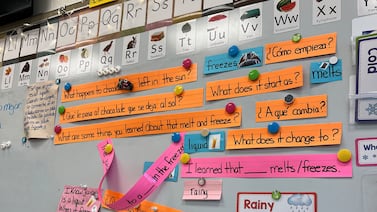Sign up for Chalkbeat New York’s free daily newsletter to keep up with NYC’s public schools.
New York City public schools families and educators: The city’s Education Department wants your help to review its K-12 financial literacy curriculum and will pay participants.
The effort, announced in an email sent this week to some school communities, comes at a time when city and state leaders have called for more robust financial education in schools, and the city is eyeing a move to implement a systemwide financial literacy program. A growing number of students and educators have highlighted the importance of gaining skills in budgeting and money management before graduation.
The city’s goal is to “engage all students in financial literacy by 2030,” according to E.M. Eisen-Markowitz, a school research, design, and learning partner from Eskolta School Research & Design, which is working with the Education Department to conduct the curriculum review.
“Superintendents will have the opportunity to select from a number of vetted curriculum options for all of the schools in their district,” Eisen-Markowitz said in an email to Chalkbeat.
Educators selected to review the curriculums will be paid hourly per session, while students and families will receive an up to $175 stipend for up to five hours of work per curriculum. Participants can review as many as five curriculums for a maximum possible stipend of $875.
Interested students, parents, and educators must fill out a form by Nov. 15 to participate.
Evaluators will be asked to read through the lessons, fill out a scorecard, have a call with a research facilitator, and attend a Zoom session on a Tuesday or Thursday evening between the months of December and March, according to the email Eisen-Markowitz sent to schools.
The calls, which will take place between 4-6 p.m., will be discussions on the curriculum with other participating educators, students, and parents.
The Education Department had already begun to support school districts implementing financial literacy instruction as the city plans to scale that instruction up to cover the entire public school system, spokesperson Chyann Tull said.
“Financial literacy is critical to the New York City Public Schools mission of ensuring that students graduate with a strong plan and a clear path to economic security,” she said in a statement. “As always, we want our students, families, and educators to have a voice in curricula that will best serve them.”
Across the state, officials have highlighted the importance of financial literacy.
In a joint op-ed earlier this year, state Education Commissioner Betty Rosa and Comptroller Thomas DiNapoli argued financial literacy should be taught in all New York schools. And as the state considers how to update New York’s high school graduation requirements, one proposal includes adding credit requirements for financial literacy.
“Just as teens are required to take a driver’s education course before getting behind the wheel of a vehicle, we have a responsibility to empower students with the skills to effectively manage their finances before applying for a credit card, student loan or mortgage,” Rosa and DiNapoli said. “It’s time for New York to catch up to states who for decades have taught a financial literacy course and required it for high school graduation.”
New York City education leaders have struck a similar tone.
During a community conversation hosted by Mayor Eric Adams at a Brooklyn middle school last week, schools Chancellor Melissa Aviles-Ramos stressed the importance of financial literacy for the city’s youth.
“What do you do with your money?” she said. “We need to stop building generational trauma in our Black and brown families and wrap our arms around them and build some generational wealth.”
Julian Shen-Berro is a reporter covering New York City. Contact him at jshen-berro@chalkbeat.org.





